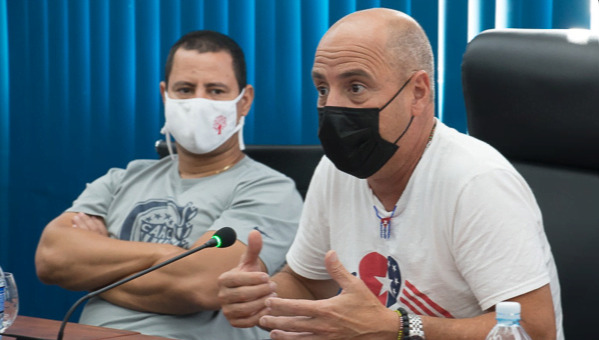
Carlos Lazo and Israel Rojas
Havana, August 24 (RHC/JIT)-- Cuban athletes are "bridges of love," said Carlos Lazo, leader of the Bridges of Love project, as he shared for nearly two hours with Cuban medalists in the recent Tokyo 2020 Olympic Games, as well as with top executives of Inder.
As part of his agenda in Havana, Lazo arrived at the main headquarters of the Institute, located in the Coliseum of the Sports City (Cuidad Deportiva), accompanied by Miguel Lewis, a member of the movement, and by Buena Fe singer-songwriter Israel Rojas, who defines himself as a bridge or facilitator between them and the Cubans living on the island.
The president of Inder, Osvaldo Vento Montiller, was waiting for them, together with the stellar Olympic athletes Luis Orta (wrestling), Serguey Torres, Fernando Dayán Jorge, Idalys Ortiz and Reineris Salas.
Also in attendance were Cuban sports glories María Caridad Colón, first Latin American Olympic champion and member of the International Olympic Committee, and former basketball player Judith Águila, who heads Inder's National Commission of Attention to Athletes.
Lazo and his companions received extensive information about Cuba's performance in Tokyo 2020, in what he describes as the most effective delegation in our history, and heard anecdotes from each of the medalists present.
Colón narrated his experiences as a member of the highest global sports body, being his first time attending an event under the five rings in that capacity.
Gisleydi Sosa, Inder's director of international relations, explained in broad strokes the current effects on Cuban sports caused by the economic, commercial and financial blockade imposed since the 1960s by the U.S. government.
In the last five years alone, the estimated cost of this brutal policy amounts to nearly 22 million dollars, a figure that would have been used to carry out many projects for the benefit of athletes and the sports movement in general.
Vento told the visitors that in the Tokyo 2020 Olympic Village, Cubans did not have access to banking services. Orta explained that a U.S. sneaker manufacturer alone was unable to supply that product to Cubans. And Serguey recounted the difficulties in accessing boats and other accessories required in his sport.
The meeting also offered the opportunity to comment on the upcoming celebration of the International Convention on Physical Activity and Sports (Afide 2021), an ideal space to build bridges of love through the sciences applied to sports.
"Cuban athletes are characterized by humility and sobriety, but I think about what they give beyond medals... They are bridges of love," Lazo said at the beginning of his speech.
"Seeing these athletes performing makes that no Cuban who loves his country can but vibrate at the achievement of a medal and the defense of the homeland in which we were born," he said animatedly.
"They are capable of unifying people who may have different ideologies. In those moments, one's heart opens and one chooses to embrace one's nation," he said with absolute certainty.
"I remember visiting the Atlanta 1996 Olympic Games in 1996. I had my misgivings, as I had only been in the United States for five years. But I sat behind those ball players and that attraction, that magnet, erased any difference," he recounted with visible feeling.
In these times of so much hatred and politicization, a home run brings enthusiasm and pride because it waves the flag. Sports build bridges of love. It hurts that the sanctions in place impact the sport in this way. This extends our desire and commitment to reestablish the best relations between Cuba and the United States, he concluded.
Lazo and his companions received various gifts, including books and some of the attire used by the Olympic delegation attending Tokyo 2020.
Israel Rojas narrated part of the personal history of Lazo, a Cuban emigrant who even enlisted in the U.S. Army for the Iraq war, and who understands like few others the importance of ending the blockade and sanctions, and for both countries to maintain civilized relations.
The artist stressed the importance of Puentes de Amor and the courage of its members, because they do it "for us" at the risk of their own lives.
"Those who criticize them in the United States, where every now and then there is a shooting for anything, cannot stop them because they are not willing to sacrifice themselves as they do," said Israel Rojas in allusion to their 5,000-kilometer bike ride from Seattle to Washington D.C., and the more than 2,000-kilometer walk between Miami and the U.S. capital.

